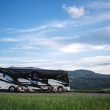Over the past +20 years, the call for “zero waste” has become more prominent as we begin to learn how our actions have impacted global warming and the negative effects global warming is having on our planet and its inhabitants. But what is zero waste, and is it realistic for your RV lifestyle? Let’s take a deeper look together.
What is Zero Waste?
According to the Institute for Total Self Reliance, the idea of zero waste began decades ago with scientists and world leaders “searching for ways to maximize materials recovery and minimize wasting by reusing, recycling, and composting everything currently being wasted.”
The Zero Waste International Alliance defines zero waste as, “the conservation of all resources by means of responsible production, consumption, reuse, and recovery of products, packaging, and materials without burning and with no discharges to land, water, or air that threaten the environment or human health.”
This alliance mainly targeted businesses and entire countries in order to create a coalition working towards zero waste. It is important to realize the individual consumer’s impact on the environment as well. From gasoline emissions and electricity consumption to the overuse of single-use plastics, we all have an opportunity to help create positive change.
The Zero Waste International Alliance accredits zero-waste businesses who report a 90% diversion of wasted materials from landfills and incinerators. And even though that isn’t 100% waste-free, it can still be challenging to achieve the ZWIA’s 90% standard. So, let’s take a look at how you can incorporate zero-waste living into your RV lifestyle.
10 Steps to Going Zero Waste: RV Edition
By choosing to live an RV lifestyle, you may have already helped cut back on waste more than you know. In a society fueled by overconsumption, RV living minimizes the space we take up. As well as the number of products we acquire, and the amount of energy it takes to heat or cool your space. Even if you use your RV primarily for leisure, campgrounds and national parks-related vacations still provide a less wasteful alternative to hotels in tourist-driven destinations where overconsumption is the standard practice.
That being said, it can be challenging to go completely waste-free in an RV due to space limitations and constant travel. However, changing your habits to achieve a zero-waste status can have a large impact on the environment. Every incremental change made along the way positively contributes to the progress.
Here are a few things you can do today to start making progress towards zero waste in an RV:
- Bring reusable bags to the grocery store, and try to purchase items that have less plastic packaging when possible. When purchasing produce, think about skipping the plastic bag or bringing your own mesh bag instead. Try to purchase from locally sourced produce. This will eliminate costs and emissions associated with transporting goods to other locations in the country.
- When shopping for food and products, write a list. Only buy what you intend to eat before the food expires. This may come more naturally when purchasing food for a smaller kitchen. But we’re all guilty of letting food expire. Making a list of items you intend to eat before they spoil can also help with overspending.
- Purchase a reusable water bottle instead of buying packages of plastic water bottles. According to Nation Swell, “Every single minute the world uses one million plastic water bottles… Use a reusable water bottle. It’ll save you about $200 a year”. Similarly, try to bring a reusable coffee mug with you when grabbing a coffee to go. Oftentimes you’ll receive a discount on your coffee while also helping the world work towards zero waste. In the same way, visiting refill stores for common goods such as toothpaste, laundry detergent, soap, and other household items can significantly cut down on the use of single-use plastic.
- When possible, opt for reusable ziplock and plastic wrap alternatives — such as stasher and beeswax wraps. You can even make your own beeswax wraps with leftover fabric scraps instead of tossing them into the waste bin.
- If you have additional cabinet space, consider making a separate compartment designated to recycling and/or composting. Sleek, multi-compartment trash bins are also available if you don’t have room for in-cabinet storage.
- Whether you travel often or if you find that you mainly stay at a home base, consider investing in an at-home composting bin. You can find small, portable bins if you need an alternative that can easily be stored and moved outside after travel. You can also make inexpensive, larger composting units for long-term stays. Once the composting is complete, you can use the compost mixture for planting a sustainable produce garden or for potted RV plants.
- If possible, mend or patch rips in clothing, fabric or upholstery instead of purchasing new items. If that isn’t possible, donate the items or find alternative methods for upcycling damaged goods.
- Avoid fast fashion by shopping for sustainably made clothing. While this may sometimes be cost-prohibitive, you can consider shopping at and donating to second-hand or thrift stores.
- In the event appliances or mechanical items are damaged, try to repair them instead of throwing them away. This can also be a more cost-effective solution. In the event an item is non-repairable, try to find a way to responsibly recycle the item instead of throwing it away.
- When you do have to throw something away, check to see if you can recycle. There may be designated recycling stops on your route for items like light bulbs and batteries.
Finding Sustainable Solutions for your RV Lifestyle
Do you have any other suggestions for living a zero-waste RV lifestyle? We’d love to hear how going zero waste has positively impacted you.
While some of these suggestions may not be applicable to your RV lifestyle, any step you can take towards eliminating waste is still a step towards a healthier planet. If you are interested in purchasing a new fuel-conscious and waste-friendly RV… Or if you want to discuss options for making your RV more waste-conscious, you can count on the experts at RVUSA.com to help you find the best solutions.






